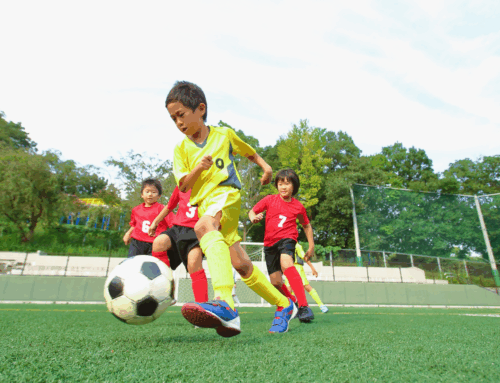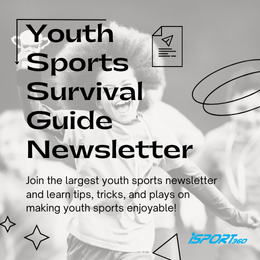Get our exclusive report. Download the iSport360 Club Switching Report Here – For Club Admins, Rec Leaders and Coaches.
How Young Athletes Can Handle Distractions
Physical skills often take center stage in training programs. However, the ability to maintain focus amid distractions frequently separates good athletes from great ones. Young athletes face a unique set of mental challenges—from performance anxiety and parental pressure to social media notifications and self-doubt. Learning to manage these distractions isn’t just crucial for athletic performance; it’s a valuable life skill that serves young people well beyond the playing field.
Understanding Common Distractions
Before addressing solutions, it’s important to recognize the most common mental distractions young athletes face:
External Distractions:
- Noisy crowds or hostile spectators
- Weather conditions (extreme heat, rain, wind)
- Unfamiliar playing environments
- Comments from coaches, parents, or teammates
- Social media notifications and digital distractions
Internal Distractions:
- Performance anxiety and fear of failure
- Overthinking technique during competition
- Dwelling on past mistakes
- Worry about coaches’ or parents’ opinions
- Fatigue and physical discomfort
Now, let’s explore effective strategies for young athletes to handle these mental challenges:
1. Develop Pre-Performance Routines
Consistent pre-performance routines serve as mental anchors that help young athletes center themselves regardless of external circumstances. These routines might include:
- Specific warm-up movements done in the same order
- Deep breathing exercises (3-5 deep breaths before competition)
- Visualization of successful performance
- A personal mantra or affirmation repeated silently
Routines provide a sense of control and familiarity even in high-pressure situations, giving young athletes something consistent to fall back on when distractions arise.
2. Practice Mindfulness and Present-Moment Focus
Mindfulness—the practice of intentionally paying attention to the present moment without judgment—is a powerful tool for managing distractions. Young athletes can develop this skill through:
- “Five senses” exercises: Briefly noting what they can see, hear, feel, smell, and taste
- Body scan techniques: Systematically checking in with different parts of the body
- Focus on breathing: Using breath as an anchor to return to the present moment
- Task-relevant focus cues: Identifying specific elements to focus on during play
Just 5-10 minutes of mindfulness practice daily can significantly improve a young athlete’s ability to refocus when distractions occur.
3. Establish Effective Thought-Stopping Techniques
When negative thoughts or distractions arise, young athletes need practical tools to interrupt unproductive mental patterns:
- Trigger words: Using a simple word like “stop,” “reset,” or “now” to interrupt negative thought cycles
- Physical cues: A gentle tap on the wrist or adjusting equipment as a pattern-interrupt
- Visualization: Mentally “changing the channel” or “turning down the volume” on distracting thoughts
- Refocus plans: Having a specific plan for where to direct attention after stopping negative thoughts
These techniques work best when practiced consistently during training, not just implemented during competition.
4. Create a Distraction Management Plan
Young athletes benefit from having a concrete plan for handling specific distractions:
- Identify common personal distractions
- Rate each distraction’s impact on performance (1-10)
- Develop specific responses for high-impact distractions
- Practice these responses during training sessions
- Evaluate and refine the plan regularly
Having a predetermined plan reduces the mental energy required to handle distractions when they arise.
5. Utilize Controlled Breathing Techniques
Proper breathing is perhaps the most accessible tool for managing distractions and anxiety:
- Box breathing: Inhale for 4 counts, hold for 4, exhale for 4, hold for 4
- 4-7-8 technique: Inhale for 4 counts, hold for 7, exhale for 8
- Tactical breathing: Equal 4-count inhale and exhale through the nose
These techniques activate the parasympathetic nervous system, reducing stress responses and improving focus.
6. Implement Mental Rehearsal
Regular mental rehearsal prepares young athletes to handle distractions effectively:
- Visualize successful performance despite specific distractions
- Mentally practice refocusing after distractions occur
- Imagine maintaining composure in challenging situations
- Include sensory details in visualization exercises
This practice builds neural pathways that make appropriate responses more automatic when real distractions occur.
7. Establish a Healthy Perspective and Self-Talk
How young athletes talk to themselves significantly impacts their ability to handle distractions:
- Develop performance-focused rather than outcome-focused goals
- Practice self-compassion when mistakes happen
- Use process-oriented self-talk that emphasizes controllable factors
- Maintain perspective about the role of sports in overall life
Young athletes who view challenges as opportunities for growth rather than threats are more resilient to distractions.
The Long-Term Benefits
The skills young athletes develop to manage distractions in sports—focus, emotional regulation, resilience, and mental discipline—transfer to academic performance, future careers, and personal relationships. By helping young athletes implement these strategies, parents and coaches aren’t just developing better competitors; they’re building more capable, confident individuals equipped to handle life’s inevitable distractions and pressures.
Remember that like any skill, distraction management improves with consistent practice. The young athlete who commits to developing their mental game alongside their physical abilities gains an invaluable competitive advantage—both in sports and in life.
About the Author:
Amy Masters is a proud sports mom, seasoned coach, and dedicated club administrator with over a decade of experience in youth athletics. She launched Jr Lions Field Hockey in Hunterdon County, growing it from just 40 players in its first season to over 150 by year three. Fueled by the growing passion and competitive spirit of local athletes, she went on to found Omega Field Hockey Club, now serving players across New Jersey and Pennsylvania.
A former collegiate athlete herself, Amy played field hockey at Lock Haven University, where her love for the game truly took root. Off the field (and somehow still finding time), she leads marketing for iSport360 and co-edits the Youth Sports Survival Guide—the largest youth sports newsletter in the world.
Learn more or request a demo of our youth sports software that is helping teams improve communication, organization and player development.
May 21, 2025





